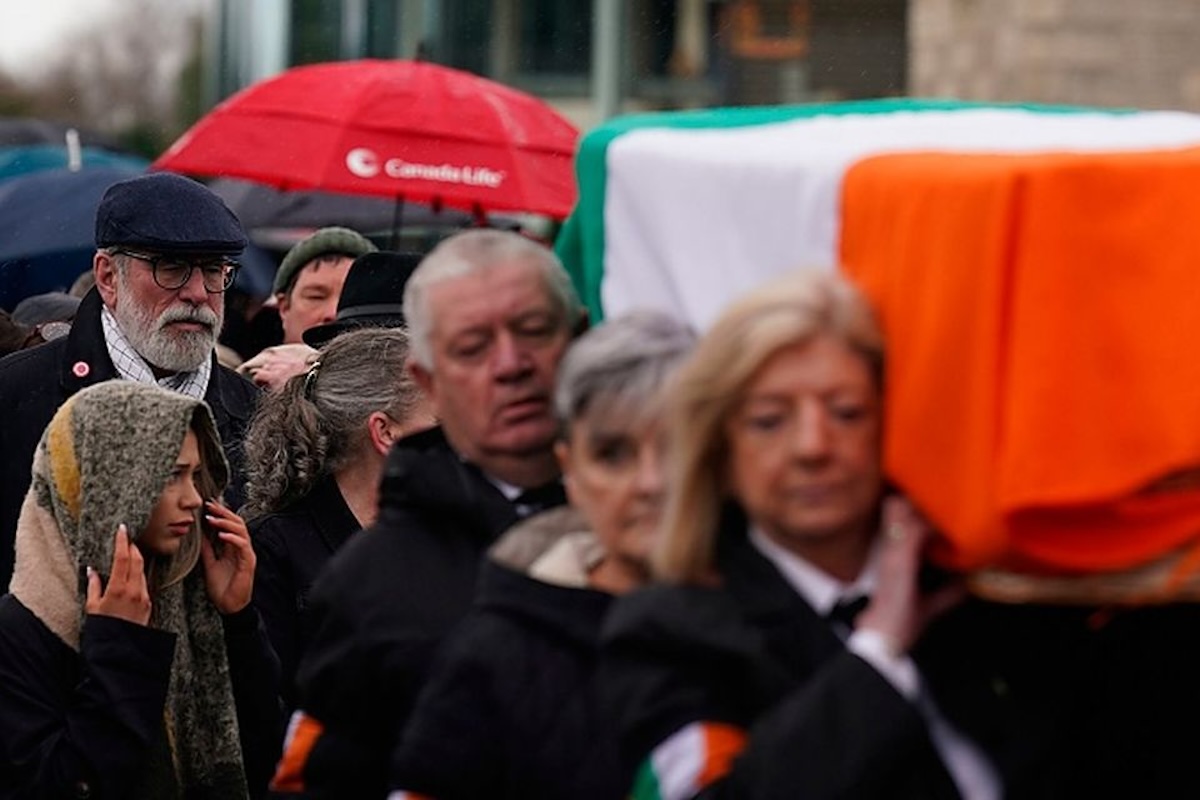
The funeral took place on Wednesday of renowned Provisional IRA Volunteer Rose Dugdale, which saw her remembered as “a true revolutionary and a true legend”.
She died peacefully in Dublin on March 18, aged 83. A new film on her life, ‘Baltimore’, is currently in release.
Born in Devon in 1941 into a wealthy English family, the republican legend followed an academic career before dedicating herself to the Irish cause after learning about it in London.
A service in celebration of her life was held in the Crematorium Chapel at Glasnevin Cemetery in Dublin. Former Sinn Féin president Gerry Adams and a number of other prominent republicans and socialists were among the mourners.
Former Sinn Féin MEP Martina Anderson read a tribute to Ms Dugdale at the service, remembering her for her journey from a “privileged upbringing to the heart of the republican struggle”.
“I stand here with a sore yet proud heart, reminded of the remarkable journey I and so many others shared together with Rose in the depths of the Irish republican struggle,” Ms Anderson said.
“Through her, intellectually, politically and personally, I learned invaluable lessons, as did many others, about resilience, dedication, speaking up, speaking out and the power of conviction.
“Rose’s legacy will forever be intertwined with the tapestry of Ireland’s fight for freedom.”
Her partner and comrade Jim Monaghan also reflected on her life, remembering her as “a force of nature”.
He recalled meeting Ms Dugdale for the first time in 1985 at a Sinn Féin office and being accused of “being sent there by the powers that be”.
“That day was the start of a 39-year friendship. Rose was a highly educated woman in politics, philosophy and economics.
“We both had a great interest in socialist politics and she taught me a lot.”
Mr Monaghan said his partner was “a woman of many talents” and well known “as an IRA Volunteer, but she also taught economics, politics and philosophy.
“She also taught English classes when she was in Limerick Prison. The women that were there, some of them couldn’t read, couldn’t write,” he said.
“She helped them through and she helped them read their letters and helped them write letters.”
He said Ms Dugdale had two bracelets on her wrist when she died, one in the colours of the Irish tricolour and the other in the colours of the Palestinian flag.
Sinn Féin TD for Dublin South-Central Aengus Ó Snodaigh read a eulogy.
“Rose was an enigma to the establishment. They couldn’t, and can’t still grasp, that somebody could turn their back on privilege in order to help the masses,” he said.
“If they had spent any time with Rose, they would come away with a clear understanding of how her passion, her drive to help the oppressed, her determination to re-balance the world order was Rose literally putting her money where her mouth was.
“Having enjoyed an early life of privilege in England living with all the trappings of wealth, she went on to reject that life that was being shaped for her and embrace wholeheartedly with no regrets a life of struggle against British imperialism and world imperialism.
“She was a true Irish republican who opposed fascism and racism in all its forms, seeing them for what they are, tools to divide the poor.”
Mr Ó Snódaigh said Ms Dugdale was among a pantheon of Irish “heroes” who were originally from other countries, alongside former President Erskine Childers.
He told a story of her in her later years canvassing for Sinn Féin during a general election despite no longer being steady on her feet.
“She was and is a true revolutionary and a true legend,” he said.
* Gerard ‘Hucker’ Moyna, a former republican prisoner and a Volunteer with the Provisional IRA, the Irish People’s Liberation Organisation and the Continuity IRA, also died last weekend. Remembered for his role in combatting loyalist murder gang, he was described by former comrades as “a formidable republican” and “another legend”.
* The death also took place last week of former Provisional IRA Volunteer Pearse McAuley, who in 1991 escaped from Brixton prison in London alongside Nessan Quinlivan. Entirely disowned by Sinn Fein in 2014, he was nonetheless accorded a republican funeral on Thursday in his native Strabane, County Tyrone.
![[Irish Republican News]](https://republican-news.org/graphics/title_gifs/rn.gif)
![[Irish Republican News]](https://republican-news.org/graphics/title_gifs/harp.gif)

